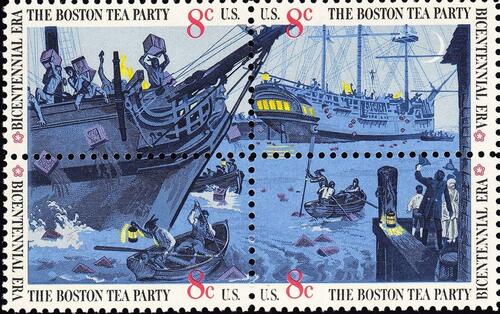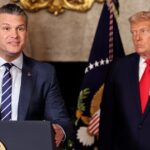
Authored by Richard Samuelson via RealClear Wire,
On the evening of December 16, 1773, 250 years ago today, New England colonists disguised as Native Americans calmly boarded three ships in Boston Harbor and dumped 90,000 pounds of tea overboard.
By 1773, the Americans had been pushing back against Parliament’s efforts to tax the colonies for roughly a decade. In 1764, Parliament passed the Sugar Act, and in 1765 the Stamp Act. These laws sparked intense resistance. The Stamp Act, requiring that all papers – legal documents, newspapers, and other publications (in addition to playing cards and dice) – bear the King’s stamp as proof of having paid the tax, sparked intense resistance, often in the form of mobs which gathered to ensure that no colonist was foolhardy enough to be the official stamp agent.
According to an old nugget of wisdom, the key to a good tax is to pluck the maximum number of feathers from the goose with a minimum amount of squawking. From that perspective, taxing writers, publishers, and lawyers was particularly ill-conceived.
But how to protest an act that faraway British subjects, with no representatives in Parliament, regarded as illegal? The colonists believed they had the right to tax themselves in their legislatures which were, significantly, the only elected legislatures in the Americas at the time.
In an age before elected legislatures were generally understood to be the heart of the government, mobbing was sometimes recognized across the board as a legitimate, albeit extreme, way of vetoing what the common people regarded as an unconstitutional law, or of blocking an illegal action by the government. Hence, colonists would distinguish between legal and illegal mobs.
Such mobs generally reflected the opinion of the local majority – they were not part of street fights between factions. Some of the Stamp Act mobs did get out of hand; others were more restrained (perhaps not by the standards of our more civilized age) and the colonists succeeded in blocking the Stamp Act, which was repealed.
Parliament saved face by asserting its right to rule the colonies “in all cases whatsoever.” Parliament soon followed that assertion with the Townshend Acts, named after the Parliamentary leader Charles Townshend. These were revenue-raising duties on lead, paper, paint, glass, and tea. The colonists resisted and boycotted the goods, and in early 1770, these taxes were also repealed, with the exception of the duty on tea, which was retained – like the previous assertion of Parliament’s right to rule – as a marker defending Parliament’s claim of the right to tax the colonists. Repeal broke the boycott, although some colonists tried to sustain the boycott on British tea, preferring smuggled tea instead. Compared to other port cities, Boston’s tea boycott was less solid after 1770.
In early 1773, with the British East India Company in financial trouble, Parliament tried to help the company, and perhaps force the tax issue, by allowing it to sell directly in the colonies, eliminating the middlemen. They were blind to the reality that this act was, in fact, extremely provocative. In reaction, the boycott movement returned in full force.
In most colonies, the patriots succeeded in keeping the tea out, but in Boston, Gov. Thomas Hutchinson sought to force the issue. He refused to give the tea ships clearance to leave port. And it was illegal for a ship to leave without proper papers. The ship owner could lose everything if he failed to comply with the law. Leading colonists repeatedly lobbied the governor to let the ships go, but he was adamant.
The first tea ships arrived in Boston Harbor on Nov. 28. By law, a ship had 19 days to unload its goods, or it was forfeited to the government on the 20th day. In other words, at midnight on Dec. 17, the tea would become the government’s property, and the government could unload it forcibly and, presumably, sell it to the minority in Boston who opposed the boycott. That would confirm the legal precedent the colonists wished to prevent – it was an implicit acceptance of the right of Parliament to tax citizens without their consent.
On the afternoon of Dec. 16, after a failed final appeal to the governor, the town of Boston convened at the Old South Church, the largest meeting house in Boston. The assembly represented the “Body” of the people, not merely a faction. After the speakers concluded that there was nothing to be done, out of the streets came the whoop of the tea partiers, disguised as Native Americans, who marched down to the harbor and systematically and peacefully destroyed the tea – and nothing but the tea.
Lifting 400-pound chests of tea with 18th-century implements was skilled work. The patriot leaders had done a good job selecting workmen. They unloaded the tea chests methodically, broke them open, and made sure the tea was spoiled in the salty water of Boston Harbor. Meanwhile, the tea partiers kept their focus on the tea, blocking, for example, those who tried to break into the ships’ liquor supply. This was no unruly, out-of-control mob parading randomly about the ships or the harbor. It was focused directly on blocking enforcement of the Tea Act.
The Tea Party was a sensation. Some colonists, notably George Washington, believed it was excessive – attacking property in the name of property rights was a step too far. But then the British government reacted harshly, replacing the free government of Massachusetts with a military one, and taking other extreme measures. Parliament’s “Intolerable Acts,” as the colonists called them, did not divide the colonies as Parliament had hoped. Instead they rendered Washington’s qualms moot. In response the colonists called the First Continental Congress; several months later, fighting began at Lexington and Concord, and we were on the road to Revolution.
At the Second Continental Congress, which met not long after those battles, Massachusetts’ John Adams nominated Virginia’s George Washington to lead the Continental Army. The Union was coming together. On the other side, Gov. Hutchinson, unwilling to bend to overwhelming public opinion, lost the right to rule. British government would suffer the same fate across the colonies.
Riots, mobs, and the like have historically been the tool of outsiders. The Tea Party was not quite that. It was the act of men who, by 1773, had long been part of their colonial political system. Yet they were outsiders in British politics. The British wished to fix that by creating a separate class of their kind of gentlemen who ruled over the colonists. The scope of the people’s role in colonial government made them shudder. In other words, they sought to change the norms of colonial government to make them more like the norms of British government. That’s what the taxes would pay for. The colonists had other ideas. And the Revolution came.
Americans today might consider a couple of lessons from the Tea Party. One has to do with tea itself. Only in the 18th century did tea begin to become a staple in Britain or British America. Enjoying daily tea and other like consumer goods became common and not merely a luxury for gentlemen and aristocrats. Tea drinking grew with the rise of global trade and the British merchant class. It was part of the revolution of rising standards of living that began in that age. (As we know today, drinking tea has health benefits. It has antioxidant properties and other good things. Globalization has many benefits.)
Back in the 18th century, the economic turn that produced an expanding middle class enjoying consumer goods, combined British liberties and literacy came the desire of more and more colonists to be respectable – and recognized as solid and responsible members of society. That meant one should not merely drink tea, but one ought to do it properly, in that way becoming a civilized British subject. Drinking tea and other respectable activities were signs that one was worthy of the responsibilities that came with British liberties. Part of the reason the colonists reacted so strongly against the efforts by Parliament to tax them without their consent was that their English cousins were, by implication, treating them as inferiors not truly worthy of the political rights that were their due.
Another lesson has to do with the mobs. This was one way those outside the political system could make their voice heard. After the Revolution, replacing bullets with ballots and mobs with peaceful mass meetings, protests, and petition campaigns represented a fundamental turn.
On the other side, the question of the right to block the government when it violates the law remains a problem, and probably will be as long as governments are staffed with human beings. In the late 1760s John Adams successfully defended John Hancock when he had his men forcibly block government agents trying to conduct an illegal search below the deck of one of his ships. Their warrant was only for the deck; Hancock kept them to the letter of the law.
The larger move from mobbing to voting was itself built upon a more robust idea of rights – the rights of men rather the rights of Englishmen. And that points to the looming crisis of slavery. As soon as the colonists transformed the rights of Englishmen into the rights of men, slavery was logically and morally untenable. Yet it was deeply entrenched. In some ways, slavery and racial caste grew deeper in a human and also perverse way to manage the tensions between American slavery and American freedom, and, as the centuries pass, the problems of race and the legacy of slavery threaten to be the dram of evil in the tragedy of American liberty.
Finally, there is in the Tea Party the eternal political problem of elites and commoners. All societies have them. When an elite grows distant (or is literally distant) and loses touch with the bulk of the people, it always causes trouble. The less connection it has to the local democratic process, the more likely it is to be a problem. On the other side, if the people have rights, they also have responsibilities.
Two hundred and fifty years after the Boston Tea Party, are our elites once again the snobs who look down on the common citizens, deeming them unworthy of full participation in government? On the other side, does the common citizen still understand that to be a citizen is, in a sense, to be a little bit of an aristocrat, with the duties and responsibilities that necessarily entails?
On this anniversary of the Tea Party, as we begin the 250th celebration of the American Revolution, we ought to begin, once again, to think seriously about what it means to live in a democratic republic, and how we might sustain it for another 250 years.
Richard Samuelson is an American historian and associate professor of government at Hillsdale College, Washington, D.C., campus.
Authored by Richard Samuelson via RealClear Wire,
On the evening of December 16, 1773, 250 years ago today, New England colonists disguised as Native Americans calmly boarded three ships in Boston Harbor and dumped 90,000 pounds of tea overboard.
By 1773, the Americans had been pushing back against Parliament’s efforts to tax the colonies for roughly a decade. In 1764, Parliament passed the Sugar Act, and in 1765 the Stamp Act. These laws sparked intense resistance. The Stamp Act, requiring that all papers – legal documents, newspapers, and other publications (in addition to playing cards and dice) – bear the King’s stamp as proof of having paid the tax, sparked intense resistance, often in the form of mobs which gathered to ensure that no colonist was foolhardy enough to be the official stamp agent.
According to an old nugget of wisdom, the key to a good tax is to pluck the maximum number of feathers from the goose with a minimum amount of squawking. From that perspective, taxing writers, publishers, and lawyers was particularly ill-conceived.
But how to protest an act that faraway British subjects, with no representatives in Parliament, regarded as illegal? The colonists believed they had the right to tax themselves in their legislatures which were, significantly, the only elected legislatures in the Americas at the time.
In an age before elected legislatures were generally understood to be the heart of the government, mobbing was sometimes recognized across the board as a legitimate, albeit extreme, way of vetoing what the common people regarded as an unconstitutional law, or of blocking an illegal action by the government. Hence, colonists would distinguish between legal and illegal mobs.
Such mobs generally reflected the opinion of the local majority – they were not part of street fights between factions. Some of the Stamp Act mobs did get out of hand; others were more restrained (perhaps not by the standards of our more civilized age) and the colonists succeeded in blocking the Stamp Act, which was repealed.
Parliament saved face by asserting its right to rule the colonies “in all cases whatsoever.” Parliament soon followed that assertion with the Townshend Acts, named after the Parliamentary leader Charles Townshend. These were revenue-raising duties on lead, paper, paint, glass, and tea. The colonists resisted and boycotted the goods, and in early 1770, these taxes were also repealed, with the exception of the duty on tea, which was retained – like the previous assertion of Parliament’s right to rule – as a marker defending Parliament’s claim of the right to tax the colonists. Repeal broke the boycott, although some colonists tried to sustain the boycott on British tea, preferring smuggled tea instead. Compared to other port cities, Boston’s tea boycott was less solid after 1770.
In early 1773, with the British East India Company in financial trouble, Parliament tried to help the company, and perhaps force the tax issue, by allowing it to sell directly in the colonies, eliminating the middlemen. They were blind to the reality that this act was, in fact, extremely provocative. In reaction, the boycott movement returned in full force.
In most colonies, the patriots succeeded in keeping the tea out, but in Boston, Gov. Thomas Hutchinson sought to force the issue. He refused to give the tea ships clearance to leave port. And it was illegal for a ship to leave without proper papers. The ship owner could lose everything if he failed to comply with the law. Leading colonists repeatedly lobbied the governor to let the ships go, but he was adamant.
The first tea ships arrived in Boston Harbor on Nov. 28. By law, a ship had 19 days to unload its goods, or it was forfeited to the government on the 20th day. In other words, at midnight on Dec. 17, the tea would become the government’s property, and the government could unload it forcibly and, presumably, sell it to the minority in Boston who opposed the boycott. That would confirm the legal precedent the colonists wished to prevent – it was an implicit acceptance of the right of Parliament to tax citizens without their consent.
On the afternoon of Dec. 16, after a failed final appeal to the governor, the town of Boston convened at the Old South Church, the largest meeting house in Boston. The assembly represented the “Body” of the people, not merely a faction. After the speakers concluded that there was nothing to be done, out of the streets came the whoop of the tea partiers, disguised as Native Americans, who marched down to the harbor and systematically and peacefully destroyed the tea – and nothing but the tea.
Lifting 400-pound chests of tea with 18th-century implements was skilled work. The patriot leaders had done a good job selecting workmen. They unloaded the tea chests methodically, broke them open, and made sure the tea was spoiled in the salty water of Boston Harbor. Meanwhile, the tea partiers kept their focus on the tea, blocking, for example, those who tried to break into the ships’ liquor supply. This was no unruly, out-of-control mob parading randomly about the ships or the harbor. It was focused directly on blocking enforcement of the Tea Act.
The Tea Party was a sensation. Some colonists, notably George Washington, believed it was excessive – attacking property in the name of property rights was a step too far. But then the British government reacted harshly, replacing the free government of Massachusetts with a military one, and taking other extreme measures. Parliament’s “Intolerable Acts,” as the colonists called them, did not divide the colonies as Parliament had hoped. Instead they rendered Washington’s qualms moot. In response the colonists called the First Continental Congress; several months later, fighting began at Lexington and Concord, and we were on the road to Revolution.
At the Second Continental Congress, which met not long after those battles, Massachusetts’ John Adams nominated Virginia’s George Washington to lead the Continental Army. The Union was coming together. On the other side, Gov. Hutchinson, unwilling to bend to overwhelming public opinion, lost the right to rule. British government would suffer the same fate across the colonies.
Riots, mobs, and the like have historically been the tool of outsiders. The Tea Party was not quite that. It was the act of men who, by 1773, had long been part of their colonial political system. Yet they were outsiders in British politics. The British wished to fix that by creating a separate class of their kind of gentlemen who ruled over the colonists. The scope of the people’s role in colonial government made them shudder. In other words, they sought to change the norms of colonial government to make them more like the norms of British government. That’s what the taxes would pay for. The colonists had other ideas. And the Revolution came.
Americans today might consider a couple of lessons from the Tea Party. One has to do with tea itself. Only in the 18th century did tea begin to become a staple in Britain or British America. Enjoying daily tea and other like consumer goods became common and not merely a luxury for gentlemen and aristocrats. Tea drinking grew with the rise of global trade and the British merchant class. It was part of the revolution of rising standards of living that began in that age. (As we know today, drinking tea has health benefits. It has antioxidant properties and other good things. Globalization has many benefits.)
Back in the 18th century, the economic turn that produced an expanding middle class enjoying consumer goods, combined British liberties and literacy came the desire of more and more colonists to be respectable – and recognized as solid and responsible members of society. That meant one should not merely drink tea, but one ought to do it properly, in that way becoming a civilized British subject. Drinking tea and other respectable activities were signs that one was worthy of the responsibilities that came with British liberties. Part of the reason the colonists reacted so strongly against the efforts by Parliament to tax them without their consent was that their English cousins were, by implication, treating them as inferiors not truly worthy of the political rights that were their due.
Another lesson has to do with the mobs. This was one way those outside the political system could make their voice heard. After the Revolution, replacing bullets with ballots and mobs with peaceful mass meetings, protests, and petition campaigns represented a fundamental turn.
On the other side, the question of the right to block the government when it violates the law remains a problem, and probably will be as long as governments are staffed with human beings. In the late 1760s John Adams successfully defended John Hancock when he had his men forcibly block government agents trying to conduct an illegal search below the deck of one of his ships. Their warrant was only for the deck; Hancock kept them to the letter of the law.
The larger move from mobbing to voting was itself built upon a more robust idea of rights – the rights of men rather the rights of Englishmen. And that points to the looming crisis of slavery. As soon as the colonists transformed the rights of Englishmen into the rights of men, slavery was logically and morally untenable. Yet it was deeply entrenched. In some ways, slavery and racial caste grew deeper in a human and also perverse way to manage the tensions between American slavery and American freedom, and, as the centuries pass, the problems of race and the legacy of slavery threaten to be the dram of evil in the tragedy of American liberty.
Finally, there is in the Tea Party the eternal political problem of elites and commoners. All societies have them. When an elite grows distant (or is literally distant) and loses touch with the bulk of the people, it always causes trouble. The less connection it has to the local democratic process, the more likely it is to be a problem. On the other side, if the people have rights, they also have responsibilities.
Two hundred and fifty years after the Boston Tea Party, are our elites once again the snobs who look down on the common citizens, deeming them unworthy of full participation in government? On the other side, does the common citizen still understand that to be a citizen is, in a sense, to be a little bit of an aristocrat, with the duties and responsibilities that necessarily entails?
On this anniversary of the Tea Party, as we begin the 250th celebration of the American Revolution, we ought to begin, once again, to think seriously about what it means to live in a democratic republic, and how we might sustain it for another 250 years.
Richard Samuelson is an American historian and associate professor of government at Hillsdale College, Washington, D.C., campus.
Loading…





